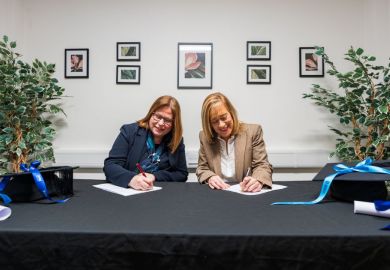Higher education institutions in the UK will need to spend an average of nearly £125 million each to fully decarbonise, a new report has estimated.
The total cost of reaching net zero for the entire sector has been put at more than £37 billion by The Cost of Net Zero, published by the Association of University Directors of Estates (AUDE), the British Universities Finance Directors Group (BUFDG) and the Alliance for Sustainability Leadership in Education (EUAC).
At £24.4 billion, costs embedded in the supply chain account for by far the most expensive area that institutions will need to tackle, with changes to the built environment costing a projected £6.5 billion and travel and transport decarbonisation £5.1 billion.
Decarbonising supply chains will require institutions to reduce “the embodied carbon in products and goods” they purchase and engage with suppliers, the report – prepared by consultancy firm Energise – suggests.
“This area will require collaboration between institutions who share common supply chains and between individual institutions and their suppliers,” it says.
For the built environment, decarbonisation can be achieved by making buildings more energy efficient, switching to renewable energy sources and behavioural change initiatives, according to the report.
Discouraging staff and students from flying and replacing transport fleets with electric or other low-carbon alternatives are among the solutions identified in the travel section, although, the report admits, these are among the most difficult and expensive actions institutions will have to take.
A “cost of net zero calculator” tool has been made available to help institutions assess their own costs in these areas.
Organisers said they hoped it would help support universities to “adopt a long-term investment approach and arrange sustainable and reliable funding”.
“Universities are facing competing demands for increasingly scarce financial resources at a time when investment in a low-carbon future is a priority,” said Karel Thomas, the BUFDG’s executive director.
“Accessing sources of finance will be much easier with a good story backed by evidence of need and purpose, and this tool gives universities and colleges a good start to understand the challenges of and options for financing a sustainable future.”
Fiona Goodwin, EAUC deputy chief executive, said the project would give institutions a “high-level estimated cost figure for achieving net zero”, many for the first time.
This would allow leaders to “understand decarbonisation as a long-term financial commitment as never before, and therefore be able to factor this into financial and strategic planning in a new way”, she said.
The work builds on a report released by the Royal Anniversary Trust earlier this year, which estimated the carbon footprint for the whole tertiary education sector is 18.1 million tonnes of carbon dioxide.
Simon Alsbury, managing director at Energise, said the tertiary education sector “has a significant role to play in the journey to net zero, by reducing its own environmental footprint, helping to develop new climate solutions through research, being a driver of collaboration/innovation across the economy, and acting as an advocate for climate action”.
Register to continue
Why register?
- Registration is free and only takes a moment
- Once registered, you can read 3 articles a month
- Sign up for our newsletter
Subscribe
Or subscribe for unlimited access to:
- Unlimited access to news, views, insights & reviews
- Digital editions
- Digital access to THE’s university and college rankings analysis
Already registered or a current subscriber?







